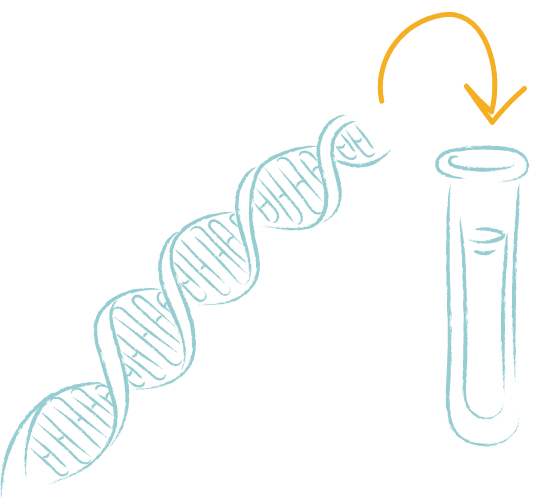for
TK2d
testing
The most direct path to diagnosing TK2d is genetic testing
Diagnosing TK2d is often a long and difficult journey. If you or your doctor suspect TK2d, the right genetic test may help reduce the amount of time it takes to get a diagnosis.
If you suspect TK2d, ask for the right genetic test early in your journey.

The most direct path to diagnosing TK2d is genetic testing
Diagnosing TK2d is often a long and difficult journey. If you or your doctor suspect TK2d, the right genetic test may help reduce the amount of time it takes to get a diagnosis.
If you suspect TK2d, ask for the right genetic test early in your journey.
Why does TK2d take so long to diagnose?
There is so little information available to doctors that they often do not know to look for TK2d, which makes it take longer to get a proper diagnosis.
In fact, people with mitochondrial disease see an average of 8 different physicians over 8 to 10 years prior to getting a diagnosis.
Another reason why it can take so long is that many disorders and diseases have symptoms similar to TK2d (such as muscular dystrophy, Pompe disease, and others). These similarities mean that many patients with TK2d end up undiagnosed or misdiagnosed with other disorders.
[TK2d is] under-diagnosed, under-recognized. There are people out there who have it and don't know about it.
Michio Hirano, MD
Lucy G. Moses Professor of Neurology and Chief of the Division of Neuromuscular Medicine at Columbia University Irving Medical Center

Genetic testing is the only way to confirm a TK2d diagnosis
Genetic testing inclusive of TK2d is the most accurate way to diagnose TK2d and should come early in the diagnostic journey. However, other tests are often ordered for patients who show symptoms of TK2d.- Lab tests look for levels of creatine kinase (CK) and lactic acid in the blood
- Doctors may also do a muscle biopsy to look for ragged red fibers, check levels of certain enzymes, and measure mitochondrial DNA levels
- Electromyography (EMG) tests may also be performed to look at muscle function
download and
share
A helpful resource for the TK2d community

Download to learn more about the cause of TK2d, symptoms, diagnosis, disease management, a multidisciplinary healthcare team approach, and patient community organizations and resources.
I was referred to a neurologist, who worked with a geneticist, who wanted to order genetic testing for muscular dystrophy… I declined and saw a different geneticist. He recommended whole-exome sequencing, which confirmed my TK2d diagnosis.
On your path to diagnosis, you may see multiple doctors, such as a neurologist, neuromuscular specialist, or geneticist
Any doctor can diagnose TK2d with the right genetic test. If you suspect TK2d or have already been diagnosed, you can connect with mitochondrial disease experts who have experience treating TK2d.
action items
- Make sure that the genetic test your doctor orders includes TK2d, because not all do. This means that past genetic tests you've had might not have been looking for TK2d
- Talk to your doctor about the different genetic testing options available, such as:
- Whole-genome sequencing
- Whole-exome sequencing
- Multi-gene panel
- Single-gene tests
- Some genetic tests come at no cost. Talk to your doctor about your eligibility for no-cost genetic testing
- If you or a loved one has been diagnosed with TK2d, you should also talk to your doctor about genetic counseling to learn if siblings or other family members could be carriers
Sign up and stay informed
Register to stay on top of the latest developments and get updated about newsworthy milestones.*All fields are required.
In addition, all of our future communications will include an opportunity to opt out. WHO WE ARE Click here to learn more about UCB and our efforts to take on TK2d.

